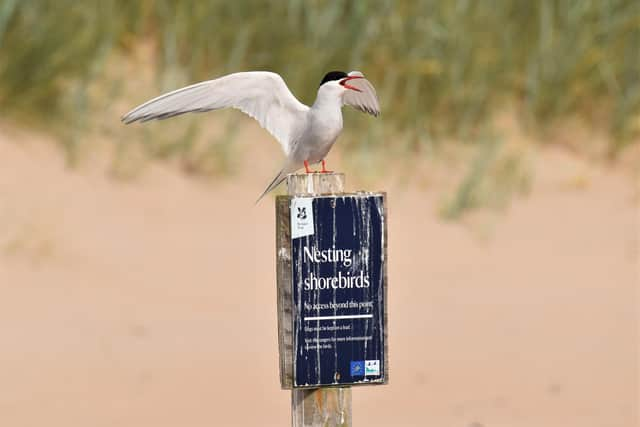Suspected bird-flu outbreak decimates breeding season at Northumberland site
and live on Freeview channel 276
Long Nanny, near Beadnell, is home to Britain’s largest mainland colony of Arctic terns but the outbreak at the peak of the breeding season has wiped out a quarter of the chicks.
The suspected outbreak comes 12 months after bird flu caused over 6,000 seabird deaths on the Farne Islands, also cared for by The National Trust.
Advertisement
Hide AdAdvertisement
Hide AdSo far this year, the team had been seeing lower numbers of dead birds on the Farne Islands, with 500 carcasses recovered to date, but in recent days the number of dead birds has increased, with a mix of species picked up including kittiwakes, black headed gulls and guillemots being the most affected.


The team are currently waiting for test results to confirm whether or not these deaths are once again due to Avian Influenza.
James Porteus, lead ranger at Long Nanny, said: “The season started so well, with over 1,600 pairs of Arctic terns returning to breed this season – the highest number of breeding pairs at the site since 2018, and we had recorded 2,600 eggs.
"But, a couple of weeks ago we started to notice that some of the chicks were dying and since then we have picked up over 600 dead Arctic tern chicks from across the site.
Advertisement
Hide AdAdvertisement
Hide Ad“We have also started to discover some dead adults now which is equally heartbreaking and worrying.
“Although we have been monitoring for and removing dead birds throughout the breeding season, we fear that an infected bird may have got into the colony and infected our breeding Arctic terns.
“We have suspended any activities which may cause disturbance to the colony, such as clutch counts or raising nests above the high tide mark – which are tasks we typically do to care for this rare seabird.”
The team hopes that the little terns will remain unaffected.
Advertisement
Hide AdAdvertisement
Hide AdJames continued: “So far, we’ve only discovered one dead adult little tern and observed one poorly chick so let’s hope the fact that they nest separately from the Arctic terns will give them some chance of survival.
“These rare seabirds which are already under such huge pressures from climate change now face even bigger challenges – but we are here and ready to do whatever we can to help – and we’re working closely with our team on the Farne Islands to share learnings and best practice.”
The team expects to have the test results back from Defra to confirm if the cause of the deaths is bird flu in the next 10 days.
Ben McCarthy, head of nature conservation and restoration ecology at the National Trust, says: “After last year’s outbreak of bird flu on the Farne Islands, when Long Nanny was unaffected, we were really hopeful that the colony would escape the worst of this deadly disease.
Advertisement
Hide AdAdvertisement
Hide Ad"However, this news, is devastating for these vulnerable birds and it will take years for the populations to recover.”
Visitors to the area are currently being advised to avoid disturbing any of the birds at Long Nanny by keeping a safe distance from the colony and keeping dogs on a short lead at all times.